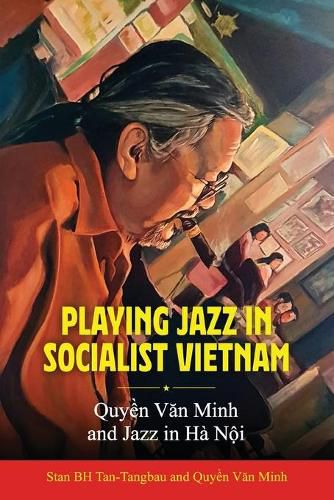Readings Newsletter
Become a Readings Member to make your shopping experience even easier.
Sign in or sign up for free!
You’re not far away from qualifying for FREE standard shipping within Australia
You’ve qualified for FREE standard shipping within Australia
The cart is loading…






This title is printed to order. This book may have been self-published. If so, we cannot guarantee the quality of the content. In the main most books will have gone through the editing process however some may not. We therefore suggest that you be aware of this before ordering this book. If in doubt check either the author or publisher’s details as we are unable to accept any returns unless they are faulty. Please contact us if you have any questions.
Quyen Van Minh (b. 1954) is not only a jazz saxophonist and lecturer at the prestigious Vietnam National Academy of Music, but he is also one of the most preeminent jazz musicians in Vietnam. Considered a pioneer in the country, Minh is often publicly recognized as the godfather of Vietnamese jazz. Playing Jazz in Socialist Vietnam tells the story of the music as it intertwined with Minh’s own narrative. Stan BH Tan-Tangbau details Minh’s life story, telling how Minh pioneered jazz as an original genre even while navigating the trials and tribulations of a fervent socialist revolution, of the ideological battle that was the Cold War, of Vietnam’s war against the United States, and of the political changes during the Doi Moi period between the mid-1980s and the 1990s.
Minh worked tirelessly and delivered two breakthrough solo recitals in 1988 and 1989, marking the first time jazz was performed in the public sphere in the socialist state. To gain jazz acceptance as a mainstream musical art form, Minh founded Minh Jazz Club. With the release of his debut album of original compositions in 2000, Minh shaped the nascent genre of Vietnamese jazz.
Minh’s endeavors kickstarted the momentum, from his performing jazz in public, teaching jazz both formally and informally, and contributing to the shaping of an original Vietnamese voice to stand out among the many styles in the jazz world. Most importantly, Minh generated a public space for musicians to play and for the Vietnamese to listen. His work eventually helped to gain jazz the credibility necessary at the national conservatoire to offer instruction in a professional music education program.
$9.00 standard shipping within Australia
FREE standard shipping within Australia for orders over $100.00
Express & International shipping calculated at checkout
This title is printed to order. This book may have been self-published. If so, we cannot guarantee the quality of the content. In the main most books will have gone through the editing process however some may not. We therefore suggest that you be aware of this before ordering this book. If in doubt check either the author or publisher’s details as we are unable to accept any returns unless they are faulty. Please contact us if you have any questions.
Quyen Van Minh (b. 1954) is not only a jazz saxophonist and lecturer at the prestigious Vietnam National Academy of Music, but he is also one of the most preeminent jazz musicians in Vietnam. Considered a pioneer in the country, Minh is often publicly recognized as the godfather of Vietnamese jazz. Playing Jazz in Socialist Vietnam tells the story of the music as it intertwined with Minh’s own narrative. Stan BH Tan-Tangbau details Minh’s life story, telling how Minh pioneered jazz as an original genre even while navigating the trials and tribulations of a fervent socialist revolution, of the ideological battle that was the Cold War, of Vietnam’s war against the United States, and of the political changes during the Doi Moi period between the mid-1980s and the 1990s.
Minh worked tirelessly and delivered two breakthrough solo recitals in 1988 and 1989, marking the first time jazz was performed in the public sphere in the socialist state. To gain jazz acceptance as a mainstream musical art form, Minh founded Minh Jazz Club. With the release of his debut album of original compositions in 2000, Minh shaped the nascent genre of Vietnamese jazz.
Minh’s endeavors kickstarted the momentum, from his performing jazz in public, teaching jazz both formally and informally, and contributing to the shaping of an original Vietnamese voice to stand out among the many styles in the jazz world. Most importantly, Minh generated a public space for musicians to play and for the Vietnamese to listen. His work eventually helped to gain jazz the credibility necessary at the national conservatoire to offer instruction in a professional music education program.